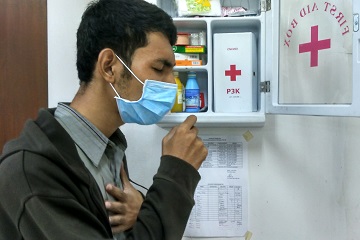Benefits of Propolis for Tuberculosis Patients

Tuberculosis (TB) is a disease caused by bacteria called Mycobacterium tuberculosis. Tuberculosis (TB) is a bacterial infection spread through inhaling tiny droplets from the coughs or sneezes of an infected person. It mainly affects the lungs, but it can affect any part of the body, including the tummy (abdomen) glands, bones and nervous system. The main symptom experienced is usually cough for two weeks or more, cough accompanied by additional symptoms of sputum, sputum mixed with blood, shortness of breath, body weakness, decreased appetite, weight loss, malaise (easy fatigue), night sweats without activity physical, and fever more than a month. Skin tests, blood tests, x-rays, and other tests can tell if a patient has TB.
Treatment of TB uses antibiotics to kill the bacteria. Effective TB treatment is difficult, due to the unusual structure and chemical composition of the mycobacterial cell wall, which hinders the entry of drugs and makes many antibiotics ineffective. The recommended treatment of new-onset pulmonary tuberculosis, as of 2010, is six months of a combination of antibiotics containing rifampicin, isoniazid, pyrazinamide, and ethambutol for the first two months, and only rifampicin and isoniazid for the last four months. Where resistance to isoniazid is high, ethambutol may be added for the last four months as an alternative. Based on some research, giving Anti Tuberculosis (OAT) provides side effects that can be toxic and damaging the liver, with symptoms that often appear like nausea, vomiting, and no appetite. This, of course, can decrease the patient's nutritional status or Malnutrition, which can lead to secondary immunodeficiency that increases the host's susceptibility to infection. In patients with tuberculosis, it leads to reduction in appetite, nutrient malabsorption, micronutrient malabsorption, and altered metabolism leading to wasting.
A group of researchers of the Department of Community Nutrition, of Faculty of Human Ecology of Bogor Agricultural University (FEMA IPB), namely Alberigo Prana Jaya and Prof. Dr. Ahmad Sulaeman interested to respond such problem. They then carried out the research program on the effect of propolis on the nutritional status of tuberculosis patients. The team carried out their research in Bogor in cooperation with some Puskesmas. Puskesmas (Indonesian: Pusat Kesehatan Masyarakat, English: Community Health Centre) are government-mandated community health clinics located across Indonesia. Patients who were tested for TB at the Puskesmas positively suffered TB were then asked for approval to follow the study.
Alberigo explained that the reason for using propolis because propolis contains antibacterial substances, immunomodulators, and hepatoprotective substances. Propolis is a natural resinous mixture produced by honeybees from substances collected from parts of plants, buds, and exudates. Due to its hepatoprotective activity, the research team is interested to investigate the effect of propolis on increased appetite, nutrient intake, body weight and ultimately the nutritional status of TB patients.
He further explained that the propolis produced by Trigona spp. bee is known to have a high level of antioxidant. Propolis is administered as a medication companion during OAT treatment. Propolis may also interact with anti-inflammatory, anti-fungal antibiotics, anti coagulants, anti-retrovirals, and anti-cancer drugs. In this study, Propolis was used in conjunction with anti-tuberculosis drugs is not antagonistic and even synergistic so that it can be added more drug-friendly anti-TB drugs.
"Propolis can help cure TB disease indirectly through improved nutritional status. Malnutrition profoundly affects cell-mediated immunity (CMI), and CMI is the principle host defense against TB. Based on this research, propolis can increase nutrient intake of TB patients. So the provision of propolis can improve the nutritional status of TB patients to help the healing process, "he concluded. (Wied)



